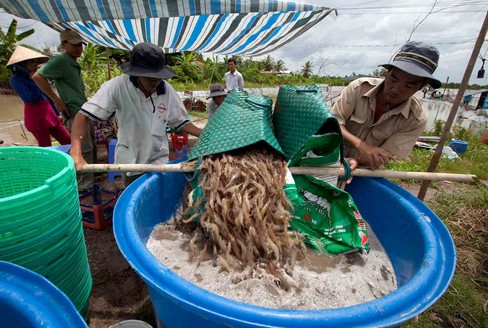Asian Seafood Raised on Pig Feces Approved for U.S. Consumers
Asian Seafood Raised on Pig Feces Approved for U.S. Consumers
October 10, 2012 — 10:00 PM MDT
Shrimp farmers in Ca Mau province in Vietnam, use ice made from tap water that the government says isn’t safe to drink without boiling it, Sept 10, 2012. Photographer: Viet Dung Tran/ Bloomberg Markets via Bloomberg.
Oct. 11 (Bloomberg) — At Ngoc Sinh Seafoods Trading & Processing Export Enterprise, a seafood exporter on Vietnam’s southern coast, workers stand on a dirty floor sorting shrimp one hot September day. There’s trash on the floor, and flies crawl over baskets of processed shrimp stacked in an unchilled room in Ca Mau.
Elsewhere in Ca Mau, Nguyen Van Hoang packs shrimp headed for the U.S. in dirty plastic tubs. He covers them in ice made with tap water that the Vietnamese Health Ministry says should be boiled before drinking because of the risk of contamination with bacteria. Vietnam ships 100 million pounds of shrimp a year to the U.S. That’s almost 8 percent of the shrimp Americans eat.
Using ice made from tap water in Vietnam is dangerous because it can spread bacteria to the shrimp, microbiologist Mansour Samadpour says, Bloomberg Markets magazine reports in its November issue.
“Those conditions — ice made from dirty water, animals near the farms, pigs — are unacceptable,” says Samadpour, whose company, IEH Laboratories & Consulting Group, specializes in testing water for shellfish farming.
Ngoc Sinh has been certified as safe by Geneva-based food auditor SGS SA, says Nguyen Trung Thanh, the company’s general director.
No Record
“We are trying to meet international standards,” Thanh says.
SGS spokeswoman Jennifer Buckley says her company has no record of auditing Ngoc Sinh.
At Chen Qiang’s tilapia farm in Yangjiang city in China’s Guangdong province, which borders Hong Kong, Chen feeds fish partly with feces from hundreds of pigs and geese. That practice is dangerous for American consumers, says Michael Doyle, director of the University of Georgia’s Center for Food Safety.
“The manure the Chinese use to feed fish is frequently contaminated with microbes like salmonella,” says Doyle, who has studied foodborne diseases in China.
On a sweltering, overcast day in August, the smell of excrement is overpowering. After seeing dead fish on the surface, Chen, 45, wades barefoot into his murky pond to open a pipe that adds fresh water from a nearby canal. Exporters buy his fish to sell to U.S. companies.
Yang Shuiquan, chairman of a government-sponsored tilapia aquaculture association in Lianjiang, 200 kilometers from Yangjiang, says he discourages using feces as food because it contaminates water and makes fish more susceptible to diseases. He says a growing number of Guangdong farmers adopt that practice anyway because of fierce competition.
“Many farmers have switched to feces and have stopped using commercial feed,” he says.
Frequently Contaminated
About 27 percent of the seafood Americans eat comes from China — and the shipments that the FDA checks are frequently contaminated, the FDA has found. The agency inspects only about 2.7 percent of imported food. Of that, FDA inspectors have rejected 1,380 loads of seafood from Vietnam since 2007 for filth and salmonella, including 81 from Ngoc Sinh, agency records show. The FDA has rejected 820 Chinese seafood shipments since 2007, including 187 that contained tilapia.
To contact the reporters for this story: Nguyen Dieu Tu Uyen in Hanoi at uyen1
William Bi in Beijing at wbi
To contact the editor responsible for this story: Jonathan Neumann at jneumann2

There is someone in this country getting paid well to allow business of this type to export into the US. Money seems to buy its way with our politicians, no matter the consequences. Our government knows these type food products are being sold inside our country to American consumers, but politicians are of the thought process they can generate a higher level of income by what many would consider as unscrupulous means, which in return allows them the ability to purchase the cleanest food available for themselves and their families. This is a win, win situation for our elected (and appointed) officials, but a losing situation for the American consumer, this is shameful when pondered.
Well said, and unfortunately for most of us, this total disregard for health safety extends over to just about everything we buy. And to make it worse, this value crosses all party lines. Alan